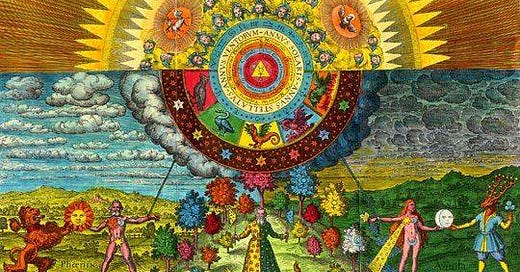National-Anarchism: Continuing the Romantic Tradition
AT the turn of the century, when I was still formulating my National-Anarchist ideas, I made a point of saying that our communities must be based around a central or unifying vision and I still believe this to be the case. As someone with an interest in Absolute Idealism, I believe that everything comes from a single infinite substance and that the distinction between subject and object is false. Like Schelling, I believe that nature is visible spirit and that spirit is invisible nature. However, I do not accept that everybody else should be dragged into the same orbit as myself on account of my own monist proclivities.
When the German Romantic philosophers first began to develop their ideas at the end of the eighteenth century, they were initially inspired by the values of the so-called Enlightenment. Their principles included political participation and the sovereignty of the individual in relation to property rights and free speech. Their opponents, on the other hand, were in favour of the ‘machine-state’ of absolutism through which a ruling prince would merely act in the name of the people themselves. The Romantic philosophers - particularly Novalis, Schlegel and Schleiermacher - were also opposed to the way the modern liberal state was held together through narrow self-interest, realising that such atomisation would lead ultimately to tyranny.
As the 1790s arrived and the full horror of the French Revolution began to unfold, the Romantics took stock of their political beliefs and moved away from the classical antiquity of Greece and Rome to seek inspiration in the Middle Ages. One reason for this was their view that the creation of an organic state was reliant upon historical continuity and a celebration of communal life.
When, in the nineteenth century, much of Romantic philosophy was taken up by Hegel and his thought became synonymous with the Absolute Idealism that had been developed slightly earlier by Schelling and others, this belief in statism went into overdrive and Hegel used his philosophy to create a terrifying political leviathan. The Italian fascist thinker, Giovanni Gentile, would later turn these ideas into what he described as Actual Idealism, something even more centralised and all-encompassing.
Returning to what I said at the beginning of this discussion, I do not believe that Absolute Idealism need ever impose itself on others or be achieved through statism. My personal vision, therefore, would be to form a National-Anarchist settlement that retains the Romantic love for individual sovereignty within a context in which people share the idea of a universal principle but without any desire to pull other communities into their trajectory. The same would apply to other National-Anarchist settlements with a universalist flavour, such as those adhering to Zen Buddhism, Christianity, Islam, Judaism, Steinerian threefolding and what have you.
Although we each believe in a ubiquitous principle, the unifying feature that permeates all such communities - and herein lies the great beauty of separatist diplomacy - must be Anarchism itself. In fact Anarchy becomes the political macrocosmic principle by which all spiritual macrocosmic principles achieve reality in a microcosmic setting of their own choosing.
As above, then so below in the tribal multiverse.




